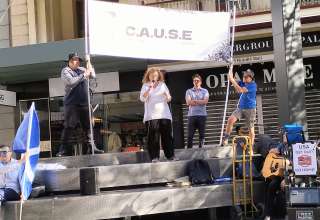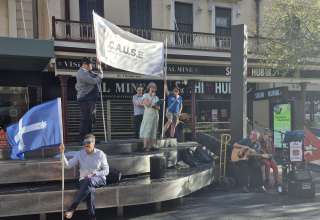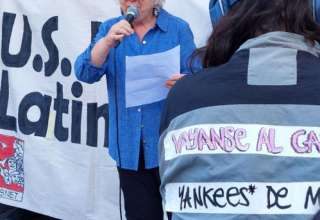by Binoy Kampmark
The AUKUS alliance is increasingly adopting a nuclear tone. First came the promise to furnish Australia with nuclear powered submarines, absent nuclear weapons, a point that did not dissuade critics such as Indonesia. Then came the announcement to deploy six B-52 bombers to the Northern Territory’s Tindal airbase, south of Darwin, an exercise underwritten by the Pentagon.
In being turned into a US military outstation in the Pacific, the question as to whether Australia will host (or has hosted) nuclear weapons, a serious one indeed. Are such arrangements ongoing, and what, in fact, constitutes hosting for the purpose of US-Australian relations and Canberra’s compliance with international obligations? Any such arrangement is bound to make a nonsense of the South Pacific Nuclear-free Zone Treaty, otherwise known as the Treaty of Rarotonga, to which Australia is a party.
The Albanese government is doing little to clarify the matter, and, in so doing, drawing even more attention to itself. Much of this is to do with the fable of extended deterrence, a belief of little substance, that maintains that Australian security can only be assured by the US nuclear umbrella. But to ensure that umbrella is effective, little can be said about it.
In Senate estimates hearings held on February 15, the Greens pressed for clarification on the issue of nuclear weapons on Australian soil, bringing the issue a prominence it has not had in years. Senator David Shoebridge asked whether Canberra was complying with the Treaty of Rarotonga, and whether visiting B-52s could carry nuclear weapons.
The latter question was almost a moot point, given that all B-52Hs are nuclear capable. The only issue is the type of nuclear enabled weapon they might carry. The nuclear gravity bomb days of the aircraft are over, but they are more than capable of being armed with nuclear-tipped cruise missiles.
In his response, Department of Defence Secretary Greg Moriarty manufactured a state of compliance with international obligations. The circle could thereby be squared. “I think more generally, it is clear stationing of nuclear weapons in Australia [that] is prohibited by the South pacific nuclear free zone treaty, to which Australia is fully committed.”
The same, however, could not be said about visiting “foreign aircraft to Australian airfields or transit of Australia’s airspace, including in the context of our training and exercise programs, and the Australia and the Australian force posture cooperation with the United States.”
Disconcertingly, Moriarty went on to acknowledge that the practice of carrying nuclear weapons on US aircraft, if it had been going on, was entirely consistent with Australia’s own commitments to both the Treaty of Rarotonga and the Nuclear Non-Proliferation Treaty. “US bomber aircraft have been visiting Australia since the early 1980s and have conducted training in Australia since 2005. Successive Australian governments have understood and respected the longstanding US policy of neither confirming nor denying the presence of nuclear weapons on particular platforms.”
Moriarty went on to acknowledge that, “Australia will continue to fully comply with our international obligations, and the United States understands and fully respects Australia’s international obligations with respect to nuclear weapons.”
Shoebridge, less than content with the secretary’s response, shot back with another question: “So, Mr. Moriarty, do I understand from that answer that defence does not believe that there is a restraint under Australia’s current treaty obligations [permitting] nuclear armed B-52 bombers to be present in Australia, provided it’s not a permanent presence?”
Moriarty never got a chance to respond. Left with an opportunity to correct the outlandishly servile, not to mention opaque nature of US-Australian security relations, Foreign Minister Penny Wong became stroppy. The tradition of Master Washington and Servant Canberra would not be bucked. “I’m the minister, and I’m responding.”
In responding, thereby channelling the self-interested voice of the US imperium, an irritated Wong deferred the issue in its entirety to Washington’s judgment, accepting the principle of “warhead ambiguity”. “It is part of ensuring we maintain that interoperability that goes to us making Australia safe. We have tried to be helpful in indicating our commitment to the South Pacific nuclear free zone treaty. We are fully committed to that. And we’ve given you the answer that the secretary has given you.”
It was, the Senator continued to elaborate, beneath the minister to “engage in any more hypotheticals” – what Shoebridge was wishing to do, she accused, was “drum up concern, and I don’t think it’s responsible.” What, then, was the appropriate response in the world according to Wong? “The responsible way of handling this is to recognise that the US has a ‘neither confirm nor deny position’ which we understand and respect.”
This stubbornly irresponsible approach by the Australian government and its public servants means that the Australian public, at no point, can know whether US aircraft or delivery systems will have nuclear weapons, even if they transit through airspace or are based, for however long, on Australian soil. As Australian Greens Senator and Foreign Affairs spokesperson Jordon Steele John described it, “Australians have resisted the nuclearisation of our military for decades and now the Albanese government is letting the Americans do it for us.”
This ingloriously subservient status to Washington has been laid bare yet again, and along with that, the increasingly likely prospect of being targeted in any future conflict that involves the United States. Hardly a responsible state of affairs, and one on the verge of being treasonous.






